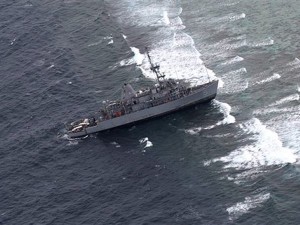MANILA, Philippines—The United States Navy’s 7th Fleet estimates the delicate extraction of the USS Guardian from Tubbataha Reef could take more than a month, as efforts are geared toward minimizing further damage to the marine environment in the protected area.
The 7th Fleet, in a statement, also said that the Guardian, which was part of its armada and was earlier declared to be “beyond economical repair,” had been “decommissioned and stricken” from the US Naval Registry as of Feb. 15.
“Although there are likely to be deviations in the dismantling plan due to changing conditions, the Navy expects the operation to take more than one month as a team of salvage experts works to remove the Guardian from the reef as quickly as safety, the weather and environmental protection allow,” the statement said.
The 68-meter Guardian, a minesweeper deployed to Sasebo, Japan, ran aground on the northwest side of the Tubbataha South Atoll, a restricted area in the Sulu Sea, on Jan. 17, as it was en route to Indonesia following a port call at Subic in Olongapo City.
Dismantling efforts began at the end of February.
Meanwhile, to learn the full impact of the Guardian’s grounding on the reef, researchers from the Tubbataha Management Office (TMO) and World Wide Fund for Nature (WWF)-Philippines will conduct coral and reef fish assessments in late April by which time the ship’s removal shall have been completed, according to the WWF.
Reef Check Ecodivers
Seven representatives from the WWF, TMO and the Puerto Princesa Subterranean River National Park (PPSRNP) underwent an intensive five-day Coral Reef Monitoring Course conducted by Reef Check International last week.
All seven graduated as “Reef Check Ecodivers,” and are now capable of assessing the condition of Tubbataha and other coral reefs in the Indo-Pacific Region for health and damage, WWF communications and media manager Gregg Yan said in a news release.
The workshop for the diver-inspectors was held aboard the Palawan-based WWF research vessel M/Y Navorca. It featured classroom lectures on fish and invertebrate identification, substrate classification and monitoring methods.
“Generally, corals are classified as hard or soft. We focus on hard corals for they literally form the backbone of the world’s reefs,” said Reef Check trainer Eznairah-Jeung Narida.
“To know whether Philippine reefs are improving or declining, regular monitoring is essential,” the trainer said.
Under a system pioneered in 1979 by respected marine scientists Ed Gomez and Angel Alcala, a former environment secretary, coral reefs with under 25-percent hard coral cover are considered poor, those between 25 and 50 percent are fair, 50 to 75 percent are good, and those of more than 75 percent are considered excellent.
The new diver-researchers are Tubbataha park superintendent Angelique Songco, Segundo Conales, Noel Bundal from TMO, Gregg Yan, Dylan Melgazo and Darius Cayanan from WWF, and Julius Parcon from PPSRNP.
The workshop was held to prepare the Tubbataha researchers for the dive season in March. In light of the Guardian grounding, the new system may also be used to assess ship grounding damage, Yan said.


